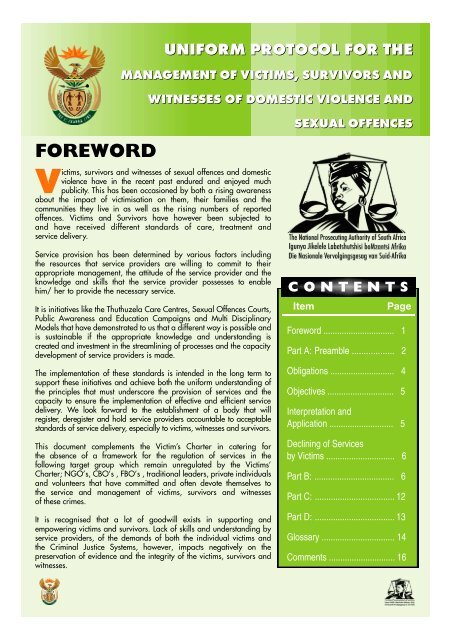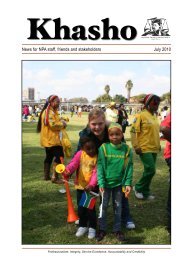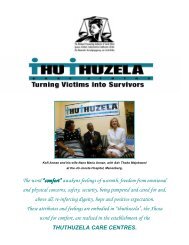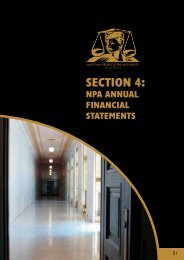Uniform Protocol for the Management of Victims, Survivors and ...
Uniform Protocol for the Management of Victims, Survivors and ...
Uniform Protocol for the Management of Victims, Survivors and ...
You also want an ePaper? Increase the reach of your titles
YUMPU automatically turns print PDFs into web optimized ePapers that Google loves.
FOREWORD<br />
<strong>Victims</strong>, survivors <strong>and</strong> witnesses <strong>of</strong> sexual <strong>of</strong>fences <strong>and</strong> domestic<br />
violence have in <strong>the</strong> recent past endured <strong>and</strong> enjoyed much<br />
p u b l i c i t y. This has been occasioned by both a rising awareness<br />
about <strong>the</strong> impact <strong>of</strong> victimisation on <strong>the</strong>m, <strong>the</strong>ir families <strong>and</strong> <strong>the</strong><br />
communities <strong>the</strong>y live in as well as <strong>the</strong> rising numbers <strong>of</strong> reported<br />
<strong>of</strong>fences. <strong>Victims</strong> <strong>and</strong> <strong>Survivors</strong> have however been subjected to<br />
<strong>and</strong> have received diff e rent st<strong>and</strong>ards <strong>of</strong> care, treatment <strong>and</strong><br />
service delivery.<br />
UNIFORM PROTOCOL FOR THE<br />
MANAGEMENT OF VICTIMS, SURVIVORS AND<br />
WITNESSES OF DOMESTIC VIOLENCE AND<br />
SEXUAL OFFENCES<br />
Service provision has been determined by various factors including<br />
<strong>the</strong> resources that service providers are willing to commit to <strong>the</strong>ir<br />
appropriate management, <strong>the</strong> attitude <strong>of</strong> <strong>the</strong> service provider <strong>and</strong> <strong>the</strong><br />
knowledge <strong>and</strong> skills that <strong>the</strong> service provider possesses to enable<br />
him/ her to provide <strong>the</strong> necessary service.<br />
It is initiatives like <strong>the</strong> Thuthuzela Care Centres, Sexual Offences Courts,<br />
Public Awareness <strong>and</strong> Education Campaigns <strong>and</strong> Multi Disciplinary<br />
Models that have demonstrated to us that a different way is possible <strong>and</strong><br />
is sustainable if <strong>the</strong> appropriate knowledge <strong>and</strong> underst<strong>and</strong>ing is<br />
c reated <strong>and</strong> investment in <strong>the</strong> streamlining <strong>of</strong> processes <strong>and</strong> <strong>the</strong> capacity<br />
development <strong>of</strong> service providers is made.<br />
The implementation <strong>of</strong> <strong>the</strong>se st<strong>and</strong>ards is intended in <strong>the</strong> long term to<br />
s u p p o rt <strong>the</strong>se initiatives <strong>and</strong> achieve both <strong>the</strong> uni<strong>for</strong>m underst<strong>and</strong>ing <strong>of</strong><br />
<strong>the</strong> principles that must underscore <strong>the</strong> provision <strong>of</strong> services <strong>and</strong> <strong>the</strong><br />
capacity to ensure <strong>the</strong> implementation <strong>of</strong> effective <strong>and</strong> efficient serv i c e<br />
d e l i v e ry. We look <strong>for</strong>w a rd to <strong>the</strong> establishment <strong>of</strong> a body that will<br />
re g i s t e r, deregister <strong>and</strong> hold service providers accountable to acceptable<br />
s t a n d a rds <strong>of</strong> service delivery, especially to victims, witnesses <strong>and</strong> surv i v o r s .<br />
This document complements <strong>the</strong> Vi c t i m ’s Charter in catering <strong>for</strong><br />
<strong>the</strong> absence <strong>of</strong> a framework <strong>for</strong> <strong>the</strong> regulation <strong>of</strong> services in <strong>the</strong><br />
following target group which remain unregulated by <strong>the</strong> <strong>Victims</strong>’<br />
Charter; NGO’s, CBO’s , FBO’s , traditional leaders, private individuals<br />
<strong>and</strong> volunteers that have committed <strong>and</strong> <strong>of</strong>ten devote <strong>the</strong>mselves to<br />
<strong>the</strong> service <strong>and</strong> management <strong>of</strong> victims, survivors <strong>and</strong> witnesses<br />
<strong>of</strong> <strong>the</strong>se crimes.<br />
It is recognised that a lot <strong>of</strong> goodwill exists in supporting <strong>and</strong><br />
empowering victims <strong>and</strong> survivors. Lack <strong>of</strong> skills <strong>and</strong> underst<strong>and</strong>ing by<br />
service providers, <strong>of</strong> <strong>the</strong> dem<strong>and</strong>s <strong>of</strong> both <strong>the</strong> individual victims <strong>and</strong><br />
<strong>the</strong> Criminal Justice Systems, however, impacts negatively on <strong>the</strong><br />
preservation <strong>of</strong> evidence <strong>and</strong> <strong>the</strong> integrity <strong>of</strong> <strong>the</strong> victims, survivors <strong>and</strong><br />
witnesses.<br />
C O N T E N T S<br />
Item<br />
Page<br />
Foreword ............................... 1<br />
Part A: Preamble . . . . . . . . . . . . . . . . . . 2<br />
Obligations ............................ 4<br />
Objectives ............................. 5<br />
Interpretation <strong>and</strong><br />
Application ............................ 5<br />
Declining <strong>of</strong> Services<br />
by <strong>Victims</strong> .............................. 6<br />
Part B: ................................... 6<br />
Part C: ................................... 12<br />
Part D: ................................... 13<br />
Glossary ................................ 14<br />
Comments ............................. 16
Continued from page 1<br />
Although led by <strong>the</strong> Sexual Offences <strong>and</strong><br />
Community Affairs (SOCA) Unit, a dire c t o r a t e<br />
within <strong>the</strong> NPA, this document is <strong>the</strong> collective work<br />
<strong>of</strong> government <strong>and</strong> <strong>the</strong> non government sector in an<br />
ef<strong>for</strong>t to set st<strong>and</strong>ards, create a new ethic <strong>and</strong> good<br />
practice that achieves a high level <strong>of</strong> serv i c e<br />
d e l i v e ry but also ensures <strong>the</strong> restoration <strong>of</strong> <strong>the</strong><br />
d i g n i t y, self respect, integrity <strong>and</strong> safety <strong>of</strong> <strong>the</strong> individual<br />
victim / survivor / witness. We also need to make<br />
s u re that our processes ensure <strong>the</strong> avoidance <strong>of</strong> <strong>the</strong><br />
contamination <strong>of</strong> <strong>the</strong> memory <strong>and</strong> evidence<br />
which <strong>of</strong>ten leads to a serious compromise <strong>of</strong> <strong>the</strong><br />
victim / survivors / witness credibility <strong>and</strong> integrity.<br />
Even though <strong>the</strong> team that worked on <strong>the</strong> document<br />
was technically quite representative we felt that we<br />
needed to invest in a wider spread consultative<br />
process that would reach most if not all service<br />
providers in <strong>the</strong> country. It is essential that those who<br />
will have to adhere to <strong>the</strong>se st<strong>and</strong>ards <strong>and</strong> those<br />
that would have to endure <strong>and</strong> enjoy <strong>the</strong> services<br />
provided on <strong>the</strong> basis <strong>of</strong> <strong>the</strong> st<strong>and</strong>ards herein are<br />
adequately consulted <strong>and</strong> fully underst<strong>and</strong> <strong>the</strong><br />
implications inherent in <strong>the</strong> setting <strong>of</strong> <strong>the</strong>se<br />
st<strong>and</strong>ards. It would thus be beneficial if some victim<br />
support groups are consulted in order to provide a<br />
holistic input to this process.<br />
The SOCA Unit wishes to extend a word <strong>of</strong> gratitude<br />
<strong>and</strong> special acknowledgement to <strong>the</strong> individuals,<br />
o rganisations <strong>and</strong> government departments that have<br />
s u p p o rted <strong>and</strong> driven this initiative with us. Special<br />
thanks go to <strong>the</strong> Greek government through its South<br />
African Embassy as well as USAID <strong>for</strong> genero u s l y<br />
p roviding <strong>the</strong> funds to enable us to achieve what we<br />
have with <strong>the</strong> speed with which we have <strong>and</strong> still<br />
helped us to maintain a high level <strong>of</strong> expertise.<br />
Adv. Thoko Majokweni: NPA-SOCA Unit.<br />
PART A:<br />
Preamble<br />
Violence against women is a manifestation<br />
<strong>of</strong> <strong>the</strong> historically unequal power<br />
relations between men <strong>and</strong> women,<br />
which have led to domination over <strong>and</strong><br />
discrimination against women, by men <strong>and</strong> to <strong>the</strong><br />
prevention <strong>of</strong> <strong>the</strong> woman’s full advancement.<br />
Fur<strong>the</strong>rmore violence against women is one <strong>of</strong> <strong>the</strong><br />
crucial social mechanisms by which women are<br />
<strong>for</strong>ced into a subordinate position in comparison<br />
to men. 1<br />
Women <strong>and</strong> children, <strong>the</strong> most vulnerable groups<br />
in our society, have been subjected to <strong>the</strong>se<br />
cruel <strong>and</strong> inhumane practices <strong>of</strong> domination.<br />
This domination has plagued <strong>the</strong> global community<br />
<strong>and</strong> is deeply rooted in <strong>the</strong> South African<br />
community, resulting in South Africa having been<br />
shamefully reported as a country with one <strong>of</strong> <strong>the</strong><br />
highest rape incidents / statistics. 2<br />
It should be understood that <strong>the</strong> very role players<br />
who have to implement <strong>and</strong> <strong>of</strong>ten influence <strong>the</strong><br />
enactment <strong>of</strong> legislation have <strong>the</strong>mselves been<br />
bred by <strong>the</strong> same communities that breed criminal<br />
behaviour. Society is invariably in<strong>for</strong>med by <strong>the</strong><br />
values emanating from <strong>the</strong>se communities.<br />
Accordingly such behaviour bred by c o m m u n i t i e s<br />
u n d e rmines <strong>the</strong> rights <strong>of</strong> women <strong>and</strong> children, it<br />
does not consider <strong>the</strong> protection <strong>of</strong> women <strong>and</strong><br />
children a priority, <strong>and</strong> views women <strong>and</strong> children<br />
who are abused as being deserving as <strong>the</strong>y must<br />
have done something to bring that abuse upon<br />
<strong>the</strong>mselves.<br />
The South African government as part <strong>of</strong> <strong>the</strong><br />
global community <strong>and</strong> an active member <strong>of</strong> <strong>the</strong><br />
African community plays a pivotal role in <strong>the</strong> fight<br />
against violence perpetrated on women <strong>and</strong><br />
children. This role has translated into interventions<br />
1<br />
SALRC Discussion Paper on Sexual Off e n c e s<br />
2<br />
1996 Interpol Report <strong>of</strong> 120 member countries, statistics re p o rt indicated that South Africa’s rape figures were <strong>the</strong> highest in <strong>the</strong> world, being 120 per 100000 population.<br />
2
Continued from page 2<br />
such as <strong>the</strong> National Crime Prevention Strategy<br />
(NCPS) (May 1996) which, promoted a victimcentred<br />
approach to crime prevention, placing <strong>the</strong><br />
onus on government to deliver a crime prevention<br />
strategy central to <strong>the</strong> rights <strong>and</strong> needs <strong>of</strong> victims.<br />
It fur<strong>the</strong>r acknowledged that victimisation lies at<br />
<strong>the</strong> heart <strong>of</strong> much retributive crime <strong>and</strong> that <strong>the</strong><br />
absence <strong>of</strong> means <strong>of</strong> victim aid <strong>and</strong> empowerment<br />
plays an important role in <strong>the</strong> nature <strong>of</strong> violence<br />
<strong>and</strong> crime in South Africa. Accordingly a<br />
national programme <strong>for</strong> victim empowerment was<br />
included in <strong>the</strong> activities <strong>of</strong> <strong>the</strong> NCPS.<br />
Historically, even be<strong>for</strong>e <strong>the</strong> dawn <strong>of</strong> <strong>the</strong> South<br />
African democratic era, government did not focus<br />
on issues <strong>of</strong> violence against women <strong>and</strong> children.<br />
On <strong>the</strong> o<strong>the</strong>r h<strong>and</strong> <strong>the</strong> key players who always<br />
had <strong>the</strong> interest <strong>of</strong> victims at heart <strong>for</strong> service<br />
delivery in this area was <strong>the</strong> civil society.<br />
In answering <strong>the</strong> call to a victim centred approach<br />
in service delivery, as heralded by <strong>the</strong> NCPS,<br />
government has in collaboration with civil society<br />
undertaken to uphold, protect, <strong>and</strong> respect <strong>the</strong><br />
rights <strong>and</strong> needs <strong>of</strong> victims <strong>of</strong> domestic violence<br />
<strong>and</strong> sexual <strong>of</strong>fences as <strong>the</strong>y engage <strong>and</strong> beyond<br />
exiting <strong>the</strong> Criminal Justice System (CJS).<br />
Research 3 has shown that many victims <strong>of</strong> crime<br />
that engage <strong>the</strong> CJS were not as anxious about<br />
<strong>the</strong> case itself. Instead <strong>the</strong>y had a greater fear<br />
about <strong>the</strong> unknown territory that would await<br />
<strong>the</strong>m when <strong>the</strong>y engage <strong>the</strong> system. It fur<strong>the</strong>r<br />
revealed that where a victim was treated with<br />
dignity <strong>and</strong> respect upon engaging <strong>the</strong> CJS, <strong>the</strong>y<br />
had a greater sense <strong>of</strong> confidence in <strong>the</strong> system<br />
<strong>and</strong> in service providers.<br />
Government has realised that <strong>the</strong> failure to treat<br />
victims with dignity, respect <strong>and</strong> underst<strong>and</strong>ing <strong>of</strong><br />
<strong>the</strong> dynamics <strong>of</strong> <strong>the</strong>se <strong>of</strong>fences results in<br />
secondary victimisation, which has thus far been<br />
prevalent in <strong>the</strong> South African Criminal Justice<br />
System. Secondary victimisation has been a<br />
phenomenon that has continued to deprive victims<br />
<strong>of</strong> domestic violence <strong>and</strong> sexual <strong>of</strong>fences <strong>of</strong> <strong>the</strong><br />
much-needed legal protection that <strong>the</strong> laws <strong>of</strong><br />
South Africa particularly <strong>the</strong> Constitution<br />
af<strong>for</strong>ds <strong>the</strong>m.<br />
The CJS continues to have an alarming number <strong>of</strong><br />
case withdrawals by complainants <strong>and</strong> a low<br />
reporting rate by victims. This is partly because<br />
<strong>of</strong> <strong>the</strong> fact that <strong>the</strong>y undergo secondary<br />
victimisation when engaging <strong>the</strong> system.<br />
As evidenced by <strong>the</strong> need to address secondary<br />
victimisation, several service providers have<br />
translated this need into various positive interv e n-<br />
tions, which however lack consistency <strong>and</strong><br />
u n i f o rmity that leads to fur<strong>the</strong>r imbalances in<br />
<strong>the</strong> treatment <strong>of</strong> victims. These imbalances include<br />
i n ter alia <strong>the</strong> unequal treatment <strong>and</strong> ineff i c i e n t<br />
s e rvice delivery to victims.<br />
Accordingly <strong>the</strong>re is a need to create uni<strong>for</strong>mity in<br />
service delivery in order to inter alia address <strong>the</strong><br />
issue <strong>of</strong> secondary victimisation <strong>and</strong> to ensure<br />
effective service delivery to <strong>the</strong>se victims.<br />
This approach would include <strong>the</strong> need <strong>for</strong><br />
supportive services that are appropriate, in<strong>for</strong>mative<br />
<strong>and</strong> accessible to victims that will ensure <strong>the</strong><br />
equal protection <strong>of</strong> <strong>the</strong>ir constitutional rights<br />
throughout <strong>the</strong> CJS.<br />
This necessitates <strong>the</strong> establishment <strong>of</strong> a coord i n a t e d<br />
approach <strong>and</strong> referral system that will regulate<br />
Victim Assistance <strong>and</strong> Preparation (VAP) services<br />
<strong>and</strong> <strong>the</strong>reby ensure uni<strong>for</strong>mity <strong>and</strong> quality control<br />
<strong>of</strong> <strong>the</strong>se services <strong>and</strong> service providers.<br />
The development <strong>and</strong> implementation <strong>of</strong> <strong>the</strong>se<br />
Minimum St<strong>and</strong>ards is <strong>the</strong>re<strong>for</strong>e a collaborated<br />
ef<strong>for</strong>t by service providers with <strong>the</strong> intention <strong>of</strong><br />
af<strong>for</strong>ding equal protection to everyone affected<br />
by <strong>the</strong>se crimes. These st<strong>and</strong>ards ensure that <strong>the</strong><br />
victim is journeyed through <strong>the</strong> system <strong>and</strong> in <strong>the</strong><br />
process empowered <strong>and</strong> supported until he or she<br />
becomes a survivor <strong>of</strong> violence.<br />
3<br />
Study conducted by <strong>the</strong> Institute <strong>for</strong> Security Studies as commissioned by <strong>the</strong> National Prosecuting Authority in 2002<br />
3
2. OBLIGATIONS<br />
Recognising that government <strong>and</strong> o<strong>the</strong>r organisations providing VAP<br />
services have undertaken to protect, respect <strong>and</strong> promote <strong>the</strong> rights <strong>of</strong><br />
victims as contained in <strong>the</strong> Constitution, certain inte rn a t i o n a l<br />
instruments, national legislation <strong>and</strong> policies.<br />
i. CONSTITUTIONAL OBLIGATIONS<br />
Service providers realise that sexual <strong>of</strong>fences <strong>and</strong><br />
domestic violence is <strong>the</strong> cause <strong>of</strong> <strong>the</strong> infringement<br />
<strong>of</strong> <strong>the</strong> constitutionally entrenched rights based<br />
on <strong>the</strong> constitutional ethos <strong>of</strong> an open <strong>and</strong><br />
democratic society based on <strong>the</strong> principles <strong>of</strong><br />
human dignity, equality <strong>and</strong> freedom.<br />
Service providers recognise that <strong>the</strong>y provide<br />
s e rvices to victims in a manner that should<br />
p romote <strong>the</strong> objects <strong>of</strong> <strong>the</strong> Bill <strong>of</strong> Rights as<br />
enshrined in <strong>the</strong> Constitution <strong>and</strong> recognise that<br />
<strong>the</strong> inherent rights to human dignity, equality,<br />
freedom <strong>and</strong> security <strong>of</strong> <strong>the</strong> person <strong>and</strong> rights<br />
a ff o rded to children should be re s p e c t e d ,<br />
protected <strong>and</strong> promoted.<br />
ii. INTERNATIONAL OBLIGATIONS<br />
Service providers affirm governments commitment<br />
to <strong>the</strong> implementation <strong>of</strong> measures aimed at<br />
p romoting rights <strong>of</strong> victims <strong>of</strong> sexual <strong>of</strong>fences <strong>and</strong><br />
domestic violence in compliance with intern a t i o n a l<br />
obligations under <strong>the</strong> United Nations (UN)<br />
Declaration <strong>of</strong> Basic Principles <strong>of</strong> Justice <strong>for</strong><br />
<strong>Victims</strong> <strong>of</strong> Crime <strong>and</strong> Abuse <strong>of</strong> Power; <strong>the</strong> UN<br />
Convention on <strong>the</strong> Elimination <strong>of</strong> all <strong>for</strong>ms <strong>of</strong><br />
Discrimination Against Women, Prevention <strong>and</strong><br />
Eradication <strong>of</strong> Violence Against Women <strong>and</strong><br />
C h i l d ren Addendum to <strong>the</strong> 1997 SADC<br />
Declaration on Gender <strong>and</strong> Development; <strong>the</strong><br />
Convention on Rights <strong>and</strong> Welfare <strong>of</strong> <strong>the</strong> Child; <strong>the</strong><br />
African Charter on <strong>the</strong> Rights <strong>of</strong> <strong>the</strong> Child <strong>and</strong> <strong>the</strong><br />
African Charter on Human <strong>and</strong> Peoples Rights;<br />
I n t e rnational <strong>Protocol</strong> on Child Pro s t i t u t i o n<br />
Trafficking <strong>and</strong> Pornography.<br />
iii. LEGISLATIVE OBLIGATIONS<br />
In relation to gender <strong>and</strong> equality, serv i c e<br />
p roviders take cognisance <strong>of</strong> <strong>the</strong> fact that<br />
government has enacted <strong>the</strong> Promotion <strong>of</strong> Equality<br />
<strong>and</strong> Prevention <strong>of</strong> Unfair Discrimination Act 4 <strong>of</strong><br />
2004, which prohibits unfair discrimination on<br />
grounds <strong>of</strong> gender including inter alia gender<br />
based violence.<br />
Service providers fur<strong>the</strong>r affirm that victims in<br />
relation to this document includes all victims <strong>of</strong><br />
crimes that are <strong>of</strong> a gender-based violence nature<br />
as well as victims that are protected under <strong>the</strong><br />
following statutes. The current <strong>and</strong> soon to be<br />
enacted Sexual Offences Act, <strong>the</strong> Domestic<br />
Violence Act 116 <strong>of</strong> 1998, The Children’s Act <strong>of</strong><br />
1968, The Child Care Act 74 <strong>of</strong> 1983 <strong>and</strong> <strong>the</strong><br />
Films <strong>and</strong> Publications Act 65 <strong>of</strong> 1996 <strong>and</strong> o<strong>the</strong>r<br />
relevant current legislation or legislation that is to<br />
be enacted in future.<br />
iv. POLICY<br />
In his State <strong>of</strong> <strong>the</strong> Nation address <strong>the</strong> State<br />
President declared <strong>the</strong> protection <strong>and</strong> maintaining<br />
<strong>of</strong> <strong>the</strong> rights <strong>of</strong> victims <strong>of</strong> sexual abuse <strong>and</strong> domestic<br />
violence 4 . He fur<strong>the</strong>r stated that government will<br />
commence with <strong>the</strong> implementation <strong>of</strong> a Victim<br />
Support Services Programme to urgently attend to<br />
<strong>the</strong> needs <strong>of</strong> <strong>the</strong>se victims. G o v e rnment has<br />
translated this commitment by approving <strong>the</strong><br />
<strong>Victims</strong> Chart e r. It has fur<strong>the</strong>r demonstrated its<br />
commitment to prioritise <strong>and</strong> address <strong>the</strong> serious<br />
impact on victims <strong>of</strong> sexual <strong>of</strong>fences <strong>and</strong> domestic<br />
violence by its creation <strong>of</strong> specialised sexual<br />
o ffences courts <strong>and</strong> support serv i c e s .<br />
4<br />
20 May 2004<br />
4
Continued from page 4<br />
3. PROBLEM STATEMENT<br />
The ch a l l e n ges facing South Afri c a n<br />
service providers <strong>and</strong> victims can briefly<br />
be set out as follows:<br />
• Lack <strong>of</strong> community awareness <strong>of</strong> rights,<br />
<strong>and</strong> available support services <strong>and</strong><br />
programmes;<br />
• There are various myths <strong>and</strong> stereotypes<br />
that result in subordination <strong>and</strong> fur<strong>the</strong>r<br />
traumatisation <strong>of</strong> victims <strong>of</strong> sexual abuse<br />
<strong>and</strong> domestic violence;<br />
• Lack <strong>of</strong> underst<strong>and</strong>ing <strong>of</strong> <strong>the</strong> legal process<br />
by service providers <strong>and</strong> victims;<br />
• Failure by service providers to spell out <strong>the</strong><br />
legal process <strong>and</strong> <strong>the</strong> responsibilities <strong>of</strong><br />
both service providers <strong>and</strong> victims;<br />
• <strong>Victims</strong> <strong>of</strong> <strong>the</strong>se <strong>of</strong>fences <strong>of</strong>ten do not<br />
report <strong>the</strong> commission <strong>of</strong> <strong>the</strong>se crimes. This<br />
is partly attributed to <strong>the</strong> fact that <strong>the</strong>re is<br />
a lack <strong>of</strong> trust in <strong>the</strong> CJS <strong>and</strong> victims’ fear<br />
<strong>of</strong> stigmatisation;<br />
• Lack <strong>of</strong> equal access to services;<br />
• Lack <strong>of</strong> uni<strong>for</strong>mity <strong>of</strong> services including but<br />
not limited to: programmes that differ in<br />
content, quality, accessibility, scope, use <strong>of</strong><br />
t e rm i n o l o g y, stru c t u re, focus <strong>and</strong>/or<br />
target group.<br />
4. OBJECTIVES<br />
These minimum st<strong>and</strong>ards have been<br />
designed as a response to th e s e<br />
challenges by:<br />
• P romoting <strong>the</strong> education <strong>of</strong> victims in<br />
relation to <strong>the</strong>ir rights <strong>and</strong> responsibilities.<br />
• Promoting <strong>the</strong> education <strong>and</strong> awareness <strong>of</strong><br />
service providers in relation to <strong>the</strong>ir duties<br />
<strong>and</strong> <strong>the</strong> legal process.<br />
• P romoting an attitudinal change in <strong>the</strong><br />
t reatment <strong>and</strong> underst<strong>and</strong>ing <strong>of</strong> <strong>the</strong>se victims<br />
<strong>and</strong> addressing <strong>the</strong> gender imbalances.<br />
• Empowering victims to make in<strong>for</strong>m e d<br />
decisions<br />
• Fur<strong>the</strong>r entrenching <strong>the</strong> need to uphold<br />
<strong>and</strong> promote <strong>the</strong> rights enshrined in <strong>the</strong><br />
constitution so as to instill confidence in <strong>the</strong><br />
CJS.<br />
• Bringing qualitative uni<strong>for</strong>mity to <strong>the</strong>se<br />
services <strong>and</strong><br />
• Providing equal access to services.<br />
5. INTERPRETATION AND APPLICAT I O N<br />
Minimum St<strong>and</strong>ards mean <strong>the</strong> st<strong>and</strong>ard s<br />
below which service provision should<br />
not be <strong>of</strong>f e red, are intended to provide a<br />
framework that in<strong>for</strong>ms <strong>the</strong> design <strong>of</strong> <strong>the</strong> content <strong>of</strong><br />
p rogrammes <strong>of</strong>f e red <strong>and</strong> fur<strong>the</strong>r spell out <strong>the</strong> rights<br />
<strong>of</strong> victims <strong>and</strong> <strong>the</strong>ir corresponding re s p o n s i b i l i t i e s .<br />
T h e re is a need to develop a uni<strong>for</strong>m process that<br />
will be <strong>the</strong> foundation <strong>for</strong> <strong>the</strong> best practice in VA P<br />
services <strong>and</strong> accreditation <strong>of</strong> programmes <strong>of</strong>fered<br />
by service providers. This should facilitate <strong>the</strong><br />
implementation <strong>and</strong> improvement <strong>of</strong> serv i c e s<br />
according to <strong>the</strong> different needs <strong>of</strong> victims.<br />
The st<strong>and</strong>ards will be used <strong>for</strong> a variety <strong>of</strong><br />
purposes, <strong>and</strong> not just as part <strong>of</strong> a regulatory<br />
process. These st<strong>and</strong>ards will be used by service<br />
5
Continued from page 5<br />
providers in self – assessment <strong>and</strong> development <strong>of</strong><br />
current <strong>and</strong> future service models <strong>and</strong> procedures<br />
as well as guidelines <strong>for</strong> <strong>the</strong> setting up <strong>of</strong> new<br />
service providers.<br />
In implementing <strong>the</strong> Minimum St<strong>and</strong>ards, service<br />
providers should take a developmental approach<br />
that allows <strong>for</strong> <strong>the</strong>m to graduate to a level where<br />
<strong>the</strong>y comply with <strong>the</strong> Minimum St<strong>and</strong>ard s .<br />
The regulation <strong>of</strong> which, should vest with an<br />
Authorised Governing Body (AGB).<br />
Nothing in <strong>the</strong>se st<strong>and</strong>ards shall be interpreted so<br />
as to limit remedies, policies or legal obligations<br />
that are o<strong>the</strong>rwise available under <strong>the</strong> applicable<br />
laws. These st<strong>and</strong>ards should be so interpreted to<br />
be applicable to all service providers unless<br />
it specifically states which service pro v i d e r<br />
it refers to. The st<strong>and</strong>ards nei<strong>the</strong>r preclude <strong>the</strong><br />
development <strong>of</strong> remedies or policies under<br />
<strong>the</strong> law.<br />
6. DECLINING OF SERVICES BY V I C T I M S<br />
Although service providers <strong>and</strong> <strong>the</strong>ir<br />
employees or volunteers are required to<br />
assist victims it should be taken<br />
cognisance <strong>of</strong> that victims are not required to<br />
accept <strong>the</strong>se services <strong>and</strong> may at any point in<br />
time decline <strong>the</strong>se services.<br />
However it should be noted that once a crime has<br />
been reported to <strong>the</strong> South African Police Service<br />
<strong>and</strong> a case docket has been opened, <strong>the</strong> National<br />
I n s t ructions <strong>for</strong> SAPS <strong>and</strong> <strong>the</strong> National<br />
Prosecuting Authority Policy Directives set out<br />
specific procedures that should be adhered to.<br />
PART B:<br />
MINIMUM STANDARDS FOR SERVICE DELIVERY<br />
<strong>Victims</strong> have <strong>the</strong> following rights:<br />
• The right to be treated with fairness <strong>and</strong> with<br />
respect <strong>for</strong> dignity <strong>and</strong> privacy <strong>and</strong> <strong>the</strong> right<br />
to freedom <strong>and</strong> security <strong>of</strong> <strong>the</strong>ir person.<br />
• The right to <strong>of</strong>fer in<strong>for</strong>mation<br />
• The right to receive in<strong>for</strong>mation<br />
• The right to protection<br />
• The right to assistance<br />
As a service provider you have <strong>the</strong> corre s p o n d i n g<br />
d u t y :<br />
• To treat victims with fairness <strong>and</strong> respect <strong>for</strong><br />
<strong>the</strong>ir dignity, privacy <strong>and</strong> freedom <strong>and</strong><br />
security <strong>of</strong> <strong>the</strong>ir person<br />
• To listen to <strong>and</strong> receive in<strong>for</strong>mation pro v i d e d<br />
by victims<br />
• To provide relevant in<strong>for</strong>mation to <strong>the</strong><br />
victim<br />
• To instill a sense <strong>of</strong> security in victims<br />
• To assist victims<br />
6
SERVICE PROVIDERS HAVE A DUTY TO TREAT VICTIMS WITH FAIRNESS AND<br />
RESPECT FOR DIGNITY AND PRIVACY AND UPHOLD THEIR RIGHT TO FREEDOM<br />
AND SECURITY OF THEIR PERSON<br />
STANDARD I<br />
Service providers shall not discriminate against any victims on any <strong>of</strong> <strong>the</strong> following<br />
grounds: race, gender, sex, pregnancy, marital status, ethnic or social origin, colour,<br />
sexual orientation, age, disability, religion, conscience, belief, culture, language <strong>and</strong><br />
birth in or out <strong>of</strong> wedlock.<br />
Section 1.01 Service providers shall without any <strong>for</strong>m <strong>of</strong> discrimination uphold <strong>and</strong> promote <strong>the</strong><br />
victim’s participation.<br />
Section 1.02 Service providers shall ensure that all victims receive equal treatment according to<br />
<strong>the</strong>ir specific needs, inclusive <strong>of</strong> equal access to medical, legal <strong>and</strong> social services.<br />
Section 1.03 Service providers shall treat victims in a manner that takes cognisance <strong>of</strong> crosscultural,<br />
linguistic, religious, socio-economic <strong>and</strong> gender issues.<br />
STANDARD II<br />
Service Providers shall respect <strong>the</strong> dignity <strong>of</strong> <strong>the</strong> victim<br />
Section 2.01 Service providers shall treat victims in a caring <strong>and</strong> sensitive manner taking into<br />
account <strong>the</strong>ir personal needs; such as amongst o<strong>the</strong>rs situation, age, gender, disability<br />
<strong>and</strong> level <strong>of</strong> maturity.<br />
Section 2.02 Service providers shall ensure that victims are treated with courtesy <strong>and</strong> compassion.<br />
Section 2.03 Service providers shall respect <strong>the</strong> victim’s moral <strong>and</strong> mental integrity.<br />
Section 2.04 Service providers shall improve <strong>the</strong> self – esteem <strong>and</strong> confidence <strong>of</strong> <strong>the</strong> victim.<br />
STANDARD III<br />
Service providers shall uphold <strong>the</strong> victim’s right to privacy<br />
Section 3.01 Service providers shall respect <strong>the</strong> victim’s wishes not to divulge in<strong>for</strong>mation unless where<br />
such in<strong>for</strong>mation is in <strong>the</strong> interest <strong>of</strong> <strong>the</strong> administration <strong>of</strong> justice.<br />
Section 3.02 Service providers shall at all times maintain confidentiality<br />
(a) Of material containing in<strong>for</strong>mation regarding victims <strong>and</strong><br />
(b) In<strong>for</strong>mation disseminated to <strong>the</strong>m by <strong>and</strong> regarding victims<br />
Section 3.03 Service providers shall ensure that interference with <strong>the</strong> victim’s private life is limited to<br />
<strong>the</strong> minimum, unless necessitated by <strong>the</strong> due administration <strong>of</strong> justice.<br />
STANDARD IV<br />
Service providers shall uphold <strong>and</strong> respect <strong>the</strong> victim’s right to freedom <strong>and</strong> security <strong>of</strong><br />
<strong>the</strong> person.<br />
Section 4.01 Service Providers shall p rovide a secure environment in which victims are pro t e c t e d<br />
f rom physical, social <strong>and</strong> emotional harm or threat <strong>of</strong> harm<br />
Section 4.02 Service providers shall not foster a behaviour that allows <strong>for</strong> a victim to be treated in a<br />
cruel, inhuman or degrading way by respecting <strong>the</strong> victim’s rights to, socio - economic,<br />
social, spiritual, physical, emotional <strong>and</strong> psychological integrity.<br />
Section 4.03 Service providers shall ensure that victims are protected from fur<strong>the</strong>r abuse within <strong>the</strong>ir<br />
7
Continued from page 7<br />
respective organisations by setting out <strong>and</strong> or developing procedures used <strong>for</strong> selecting<br />
<strong>and</strong> vetting all staff as fit <strong>and</strong> proper persons.<br />
Section 4.04 Service providers shall, where it is evident that <strong>the</strong> victim requires pr<strong>of</strong>essional<br />
counselling <strong>and</strong> or <strong>the</strong>rapeutic s e rv i ces not provided <strong>for</strong> by that service provider, uphold<br />
<strong>and</strong> respect <strong>the</strong> victim’s right to mental <strong>and</strong> psychological integrity by referring <strong>the</strong><br />
victim to <strong>the</strong> relevant registered role player(s).<br />
Section 4.05 Where a service provider has referred a victim as per clause 4.04, such service<br />
provider shall ensure a follow through <strong>of</strong> such re f e rr a l .<br />
Section 4.06 Service providers shall assist <strong>the</strong> victim to access witness protection mechanisms.<br />
Section 4.07 Service providers shall, where applicable, take <strong>the</strong> n e c e s s a ry protective measure s ,<br />
where <strong>the</strong>re is a threat <strong>of</strong> harm to <strong>the</strong> victim, as a result <strong>of</strong> intimidation or retaliation<br />
or violation <strong>of</strong> bail conditions.<br />
Section 4.08 Service providers shall, where <strong>the</strong>y are not in a position to take <strong>the</strong> necessary<br />
measures as referred to in Sec. 4.06,refer it to a relevant service provider who<br />
can take protective measures.<br />
STANDARD V<br />
Service providers shall ensure that <strong>the</strong> best interests <strong>of</strong> victims are taken into consideration<br />
when referring to a registered <strong>the</strong>rapist.<br />
Section 5.01 Service providers shall at all times, take <strong>the</strong> <strong>the</strong>rapeutic needs <strong>of</strong> <strong>the</strong> victim into<br />
consideration<br />
(a) In doing so:<br />
(i)<br />
(ii)<br />
The impact <strong>of</strong> <strong>the</strong> provision <strong>of</strong> <strong>the</strong>rapy on a potential criminal proceeding, must be taken<br />
into consideration<br />
The consequences <strong>for</strong> <strong>the</strong> victim ei<strong>the</strong>r proceeding with <strong>the</strong> <strong>the</strong>rapy or deciding not to must<br />
be taken into consideration.<br />
(b) Therapeutic services by pr<strong>of</strong>essionals must be re g i s t e red with <strong>the</strong> relevant authority/<br />
pr<strong>of</strong>essional council.<br />
Section 5.02 Where a decision to refer a victim has been made <strong>the</strong> following should be considered.<br />
(a) The likely consequences <strong>for</strong> <strong>the</strong> criminal trial in <strong>the</strong>se instances;<br />
(b) That <strong>the</strong>se cases are dealt with expeditiously;<br />
(c) The qualifications <strong>and</strong> or expertise <strong>of</strong> <strong>the</strong> persons who would be conducting <strong>the</strong> pr<strong>of</strong>essional serv i c e .<br />
(d) Safeguarding <strong>the</strong> confidentiality <strong>of</strong> <strong>the</strong> in<strong>for</strong>mation <strong>for</strong>thcoming from <strong>the</strong> pr<strong>of</strong>essional service<br />
provider, taking into account <strong>the</strong> rights to fair trial <strong>of</strong> an accused <strong>and</strong> that <strong>the</strong> accused <strong>and</strong> <strong>the</strong><br />
court should be made aware <strong>of</strong> in<strong>for</strong>mation that may undermine <strong>the</strong> prosecutions case or assist<br />
<strong>the</strong> defence.<br />
Section 5.03 Service providers shall advise <strong>the</strong> victim <strong>of</strong> <strong>the</strong> advantages <strong>of</strong> laying a <strong>for</strong>mal complaint<br />
with <strong>the</strong> South African Police Service where it has not been done.<br />
8
STANDARD VI<br />
Service providers shall strive to eliminate secondary victimisation<br />
Section 6.01 Service providers shall<br />
(a) Attend to victims promptly;<br />
(b) Prepare victims <strong>for</strong> court by empowering <strong>the</strong>m with <strong>the</strong> knowledge <strong>of</strong> <strong>the</strong> court process;<br />
(c)<br />
Provide <strong>the</strong>m with emotional support throughout <strong>the</strong> court process <strong>and</strong> ensure a good working<br />
relationship at a multi-disciplinary level;<br />
(d) Provide victims with skills to enable <strong>the</strong>m to cope in court;<br />
(e)<br />
(f)<br />
Utilise interviewing <strong>and</strong> assessment techniques that minimise trauma to victims;<br />
Where relevant, when a witness has to testify, ensure that <strong>the</strong> best interests <strong>of</strong> <strong>the</strong> witness are<br />
taken into consideration inter alia in relation to:<br />
(i)<br />
(ii)<br />
(iii)<br />
Testifying by way <strong>of</strong> a closed circuit television system;<br />
Testifying through an intermediary;<br />
Testifying with <strong>the</strong> use <strong>of</strong> a one way mirror.<br />
Section 6.02 Services shall be provided in an environment that is conducive to <strong>the</strong> victims needs.<br />
(a) The interview shall take place in an environment that safeguards <strong>the</strong> victim’s privacy <strong>and</strong><br />
confidentiality.<br />
(b) The environment shall be victim friendly <strong>and</strong> at a place where <strong>the</strong> victim will not come into<br />
contact with <strong>the</strong> perpetrator.<br />
Section 6.03 In relation to<br />
(a) Domestic violence <strong>and</strong> <strong>the</strong> ambit <strong>of</strong> <strong>the</strong>ir duties, service providers shall support a victim at court<br />
during testimony <strong>and</strong> accompany a victim to court where so requested by a victim.<br />
(b) A victim <strong>of</strong> a sexual <strong>of</strong>fence, <strong>the</strong> service provider shall accompany a victim to court where so<br />
requested by <strong>the</strong> victim.<br />
SERVICE PROVIDERS HAVE A DUTY TO INFORM VICTIMS OF<br />
ISSUES THAT WOULD AFFECT THEM.<br />
STANDARD VII<br />
Service providers shall in<strong>for</strong>m victims about <strong>the</strong> justice processes, cycle times <strong>of</strong> cases, <strong>the</strong><br />
victims rights, roles, responsibilities <strong>and</strong> or opportunities to participate in all processes.<br />
Section 7. 01<br />
Section 7.02<br />
Section 7.03<br />
Section 7.04<br />
Section 7.05<br />
Service providers shall disseminate relevant in<strong>for</strong>mation in a manner that is accessible to<br />
victims <strong>and</strong> in a language <strong>the</strong> victim underst<strong>and</strong>s taking into consideration inter alia <strong>the</strong><br />
victims’ age <strong>and</strong> developmental factors, socio-cultural, diversity factors <strong>and</strong> disabilities.<br />
Service providers shall in<strong>for</strong>m victims <strong>of</strong> <strong>the</strong>ir rights <strong>and</strong> how such rights can be exercised.<br />
Service providers shall in<strong>for</strong>m victims <strong>of</strong> <strong>the</strong>ir role in <strong>the</strong> Criminal Justice System. This shall<br />
include <strong>the</strong>ir role <strong>and</strong> <strong>the</strong> implications <strong>of</strong> being a witness in a criminal trial.<br />
Service providers shall in<strong>for</strong>m victims about <strong>the</strong> outcomes <strong>of</strong> bail applications, bail<br />
conditions <strong>and</strong> procedures that should be followed in <strong>the</strong> event <strong>of</strong> a violation <strong>of</strong> bail<br />
c o n d i t i o n s .<br />
Service providers should provide sufficient in<strong>for</strong>mation to victims, to ensure that a victim<br />
makes an in<strong>for</strong>med decision by promoting <strong>the</strong> victim’s active participation in:<br />
(a)<br />
(b)<br />
The Criminal Justice Process<br />
Decision making processes<br />
9
STANDARD VIII<br />
Service providers shall in<strong>for</strong>m victims <strong>of</strong> services available <strong>and</strong> relevant to <strong>the</strong> victim in<br />
order to provide a holistic victim support service.<br />
Section 8.01 Service providers shall in<strong>for</strong>m victims <strong>of</strong> legal, medical, social, psychological<br />
services <strong>and</strong> safety mechanisms <strong>and</strong> o<strong>the</strong>r pr<strong>of</strong>essional services available to <strong>the</strong><br />
victim.<br />
Section 8.02 Service providers shall in<strong>for</strong>m <strong>the</strong> victims or witnesses <strong>of</strong> witness protection<br />
measures.<br />
Section 8.03 Service providers shall in<strong>for</strong>m <strong>the</strong> victim <strong>of</strong> <strong>the</strong> importance <strong>of</strong> accessing <strong>and</strong> utilising<br />
legal, medical, social, <strong>and</strong> psychological or o<strong>the</strong>r pr<strong>of</strong>essional services whenever <strong>the</strong><br />
need <strong>for</strong> referral to such services arises.<br />
Section 8.04 Service providers shall, when it comes to <strong>the</strong> attention <strong>of</strong> <strong>the</strong> service provider that a<br />
victim needs to be removed from <strong>the</strong> victim’s home environment <strong>for</strong> <strong>the</strong> victims<br />
safety, in<strong>for</strong>m <strong>the</strong> victim <strong>of</strong> <strong>the</strong> appropriate procedures that can be followed <strong>and</strong><br />
<strong>the</strong> importance <strong>of</strong> following such procedures.<br />
Section 8.05 Service providers shall advise victims <strong>of</strong> safety measures that could be taken.<br />
Section 8.06 Service providers shall in<strong>for</strong>m victims <strong>of</strong> <strong>the</strong> outcomes <strong>of</strong> cases where relevant.<br />
SERVICE PROVIDERS HAVE A DUTY TO RECEIVE AND PROCESS<br />
INFORMATION PROVIDED BY VICTIMS<br />
STANDARD IX<br />
S e rvice prov i d e rs shall ensure that info rmation provided by <strong>the</strong> victim is re c o rded <strong>and</strong> or<br />
processed appropriately <strong>and</strong> at all times maintain <strong>the</strong> integrity <strong>of</strong> such in<strong>for</strong>mation.<br />
Section 9.01 Service providers shall listen to <strong>the</strong> victim attentively with an underst<strong>and</strong>ing <strong>of</strong><br />
cross-cultural, language, religious, social <strong>and</strong> gender diff e re n c e s .<br />
Section 9.02 Service providers shall record in<strong>for</strong>mation correctly, in writing or electronically <strong>and</strong><br />
in one <strong>of</strong> <strong>the</strong> <strong>of</strong>ficial languages, taking into account <strong>the</strong> due administration <strong>of</strong> justice.<br />
Section 9.03 Service providers shall, when assessing <strong>the</strong> victim’s needs, take into account all<br />
relevant in<strong>for</strong>mation such as amongst o<strong>the</strong>rs re f e rral <strong>for</strong> pr<strong>of</strong>essional counselling <strong>and</strong><br />
using <strong>the</strong> victim as a witness.<br />
Section 9.04 S e rvice providers shall, ensure a comprehensive <strong>and</strong> confidential transfer <strong>of</strong><br />
in<strong>for</strong>mation <strong>and</strong> material containing in<strong>for</strong>mation:<br />
(a) When making a re f e rral in terms <strong>of</strong> Sec. 9.03, to such re g i s t e red <strong>and</strong> accredited pro f e s s i o n a l ;<br />
(b) When h<strong>and</strong>ing over in<strong>for</strong>mation to o<strong>the</strong>r relevant service providers.<br />
Section 9.05 Service providers shall ensure that any in<strong>for</strong>mation imparted to a victim is corre c t l y<br />
re c o rded <strong>and</strong> filed <strong>and</strong> where such victim is updated on any fur<strong>the</strong>r outcomes, <strong>the</strong>n<br />
such outcomes shall also be correctly recorded <strong>and</strong> filed.<br />
10
STANDARD X<br />
Service providers shall uphold an applicable code <strong>of</strong> ethics <strong>and</strong> conduct.<br />
Section 10 . 01S e rvice providers should conduct <strong>the</strong>mselves in an ethically <strong>and</strong> morally acceptable<br />
manner when dealing with victims <strong>and</strong> where applicable adhere to <strong>the</strong>ir<br />
pr<strong>of</strong>essional codes <strong>of</strong> conduct.<br />
Section 10 . 0 2Where <strong>the</strong>re is no code <strong>of</strong> conduct, service providers shall develop a code <strong>of</strong> ethics<br />
<strong>for</strong> good conduct.<br />
Section 10 . 0 3The service provider shall ensure that:<br />
(a) Persons who are aware <strong>of</strong> <strong>the</strong> fact that <strong>the</strong>y are on call <strong>for</strong> <strong>the</strong> provision <strong>of</strong> VAP s e rvices do<br />
not participate in concentration impairing substance consumption.<br />
( b ) S t a ff shall not consume alcohol or concentration impairing substances whilst or prior to<br />
providing any support services.<br />
(c)<br />
Staff shall refrain from using language, signs or bodily gestures that have <strong>the</strong> potential to<br />
<strong>of</strong>fend, whe<strong>the</strong>r this is racist, sexist, or discriminatory in any o<strong>the</strong>r way to <strong>and</strong> in <strong>the</strong> presence<br />
<strong>of</strong> victims.<br />
Section 10 . 04Service providers shall at all times take into account <strong>the</strong> fact that <strong>the</strong>y may be<br />
called to testify in court (in relation to a case concerning <strong>the</strong> victim) <strong>and</strong><br />
should accordingly uphold <strong>and</strong> have respect <strong>for</strong> <strong>the</strong> due administration <strong>of</strong> justice.<br />
S E RVICE PROVIDERS SHALL UPHOLD A HIGH LEVEL OF PRO F E S S I O NA L I S M<br />
STANDARD XI<br />
Service providers shall ensure that <strong>the</strong>re are victim safety measures in place.<br />
Section 11. 01 Where <strong>the</strong>re is an allegation that a staff member has committed an <strong>of</strong>fence on a<br />
victim, <strong>the</strong> service provider shall refer <strong>the</strong> matter to <strong>the</strong> South African<br />
Police Services immediately.<br />
Section 11. 0 2Where such an allegation is not <strong>of</strong> a criminal nature <strong>the</strong>n such matter<br />
shall be dealt with expeditiously in accordance with <strong>the</strong> rules <strong>and</strong> regulations<br />
<strong>of</strong> an authorised governing body.<br />
Section 11. 0 3S e rvice providers shall develop safety measures where none are in place.<br />
11
SERVICE PROVIDERS HAVE A DUTY TO ENSURE CAPACITY<br />
BUILDING WITHIN THEIR RESPECTIVE ORGANISATIONS TO<br />
ENHANCE QUALITY SERVICE PROVISION<br />
STANDARD XII<br />
Service providers shall promote knowledge & skills development<br />
Section 12 . 01S e rvice providers shall ensure that staff receive basic, accredited <strong>and</strong><br />
st<strong>and</strong>ardised annual training on <strong>the</strong> following:<br />
(a)<br />
(b)<br />
(c)<br />
(d)<br />
(e)<br />
(f)<br />
Sensitivity training on <strong>the</strong> nature, dynamics <strong>and</strong> social context related to sexual abuse<br />
<strong>and</strong> domestic violence,<br />
Communication <strong>and</strong> interviewing skills such as skills to deal with victims in an<br />
empa<strong>the</strong>tic, constructive <strong>and</strong> reassuring manner,<br />
Basic administration skills,<br />
Training on <strong>the</strong> court process including but not limited to:<br />
(i)<br />
(ii)<br />
Court preparation,<br />
Court procedure,<br />
Signs <strong>and</strong> symptoms that point towards evidence <strong>of</strong> crime towards children,<br />
Crisis assessment skills <strong>and</strong> techniques, especially with a need <strong>for</strong> making referrals.<br />
Section 12 . 0 2Fur<strong>the</strong>r training shall include:<br />
(a)<br />
(b)<br />
(c)<br />
(d)<br />
(e)<br />
(f)<br />
(g)<br />
Legislative <strong>and</strong> policy developments including but not limited to:<br />
(i)<br />
(ii)<br />
The Constitution,<br />
The <strong>Victims</strong> Charter <strong>and</strong> <strong>the</strong> Integrated Victim Empowerment Policy <strong>and</strong> o<strong>the</strong>r<br />
relevant policies or st<strong>and</strong>ards,<br />
Relevant Human Rights st<strong>and</strong>ards <strong>and</strong> principles,<br />
Principles <strong>and</strong> ethical duties <strong>of</strong> <strong>the</strong>ir <strong>of</strong>fices,<br />
Diversity training,<br />
Where applicable, methods to preserve <strong>and</strong> protect <strong>the</strong> integrity <strong>of</strong> evidential material<br />
<strong>and</strong> questioning <strong>of</strong> victims <strong>for</strong> statement taking purposes,<br />
Roles <strong>and</strong> services provided by o<strong>the</strong>r service providers,<br />
New developments in service delivery improvements.<br />
Section 12 . 0 3Service providers shall keep abreast <strong>of</strong> new developments in service delivery<br />
improvement.<br />
12
PART C:<br />
MINIMUM STANDARDS FOR MONITORING<br />
AND EVALUATION<br />
STANDARD XIII<br />
S e rvice prov i d e rs shall implement mechanisms <strong>for</strong> monito ring <strong>and</strong> evaluation as<br />
determined by an authorised governing body.<br />
Section 13 . 01 Service providers shall develop <strong>and</strong> or implement a tool that can be completed<br />
by victims <strong>for</strong> improvement to <strong>the</strong>ir service delivery.<br />
Section 13 . 0 2Service providers shall develop <strong>and</strong> or implement a tool that can be completed<br />
by staff <strong>for</strong> improvement to <strong>the</strong>ir service delivery.<br />
PART D:<br />
MINIMUM STANDARDS FOR GOVERNANCE<br />
STANDARD XIV<br />
S e rvice prov i d e rs shall satisfy all<br />
re qu i rements imposed on <strong>the</strong>m by th i s<br />
document<br />
Section 14 . 01Service providers shall comply with<br />
<strong>the</strong> duties imposed on <strong>the</strong>m by this<br />
document within six to twelve<br />
months <strong>of</strong> certification by an<br />
Authorised Governing Body.<br />
STANDARD XV<br />
S e rvice prov i d e rs shall seri o u s ly,<br />
expeditiously <strong>and</strong> without reprisal address<br />
concerns <strong>and</strong> complaints by victims about<br />
any <strong>of</strong> <strong>the</strong>ir services.<br />
Section 15.01S e rvice providers should develop<br />
complaint mechanisms as set out by<br />
<strong>the</strong> Authorised Governing Body .<br />
Section 15 . 0 2S e rvice providers shall<br />
re p o rt such complaints to<br />
<strong>the</strong> Authorised Govern i n g<br />
Body; this will not preclude<br />
<strong>the</strong> victims from re p o rt i n g<br />
<strong>the</strong>ir complaints directly to<br />
<strong>the</strong> Authorised Govern i n g<br />
Body nor any o<strong>the</strong>r<br />
relevant authority.<br />
STANDARD XVI<br />
All service providers shall, where applicable<br />
adhere to <strong>the</strong> procedures <strong>and</strong> guidelines, as<br />
set out in <strong>the</strong>ir respective policies or instructions,<br />
laws, <strong>the</strong> Service Charter <strong>for</strong> <strong>Victims</strong><br />
<strong>of</strong> Crime <strong>and</strong> <strong>the</strong> Minimum St<strong>and</strong>ard s<br />
attached <strong>the</strong>reto <strong>and</strong> <strong>the</strong> Vi c t i m<br />
E m p o w e rment Policy <strong>and</strong> Minimum<br />
S t a n d a rds attached <strong>the</strong>reto <strong>and</strong> o<strong>the</strong>r re l e v a n t<br />
policies when providing VAP services.<br />
13
GLOSSARY<br />
WORD<br />
Accredited Service Provider Programme<br />
Authorised Governing Body (AGB)<br />
DEFINITION<br />
Programmes used by service providers which are<br />
a c c redited by <strong>the</strong> South African Qualifications<br />
Authority.<br />
Body, established through legislation or a designated<br />
b o d y, that will bear <strong>the</strong> responsibility <strong>for</strong> <strong>the</strong><br />
registration, deregistration, certification, de-cert i f i c a t i o n ,<br />
monitoring, evaluation <strong>of</strong> <strong>and</strong> discipline <strong>of</strong><br />
service providers.<br />
Civil society Includes Non Governmental Org a n i s a t i o n s<br />
( N G O ’s), Faith Based Organisations (FBOs),<br />
Community Based Organisations (CBOs) <strong>and</strong> o<strong>the</strong>r<br />
non pr<strong>of</strong>it organisations providing services to victims<br />
<strong>of</strong> sexual abuse <strong>and</strong> domestic violence.<br />
Cycle times<br />
Follow through<br />
Language<br />
Rights<br />
Service provider<br />
UPVM<br />
The period <strong>of</strong> time taken from <strong>the</strong> reporting <strong>of</strong> <strong>the</strong><br />
crime to <strong>the</strong> police till <strong>the</strong> finalisation <strong>of</strong> <strong>the</strong> case.<br />
Obtaining feedback or ensuring that <strong>the</strong> victim is<br />
receiving services where <strong>the</strong> victim was referred.<br />
Includes verbal <strong>and</strong> sign language.<br />
This would include rights under <strong>the</strong> Constitution,<br />
this document, <strong>the</strong> Service Charter <strong>for</strong> <strong>Victims</strong> <strong>of</strong><br />
Crime <strong>and</strong> <strong>the</strong> Minimum St<strong>and</strong>ards attached <strong>the</strong>reto,<br />
Victim Empowerment Policy <strong>and</strong> <strong>the</strong> Minimum<br />
S t a n d a rds attached <strong>the</strong>reto <strong>and</strong> o<strong>the</strong>r re l e v a n t<br />
legislation <strong>and</strong> policies creating furt h e r<br />
relevant rights.<br />
All organisations <strong>and</strong> or individuals whe<strong>the</strong>r in <strong>the</strong><br />
employ <strong>of</strong> such organisation or in a voluntary<br />
c a p a c i t y, <strong>of</strong>fering relevant services in terms <strong>of</strong><br />
this document.<br />
<strong>Uni<strong>for</strong>m</strong> <strong>Protocol</strong> <strong>for</strong> <strong>the</strong> <strong>Management</strong> <strong>of</strong> <strong>Victims</strong>,<br />
<strong>Survivors</strong> <strong>and</strong> Witnesses <strong>of</strong> Domestic Violence <strong>and</strong><br />
Sexual Offences.<br />
14
VAP services<br />
Services aimed at assisting victims <strong>and</strong> witnesses<br />
inclusive but not limited to victim assistance, court<br />
preparation, court support <strong>and</strong> o<strong>the</strong>r support services<br />
contracted or not contracted by government.<br />
Victim<br />
A person who has suffered harm including physical<br />
or mental injury, emotional suffering, economic loss<br />
or substantial impairment <strong>of</strong> his or her fundamental<br />
rights, through acts or omissions that are in violation<br />
<strong>of</strong> our criminal law relating to sexual <strong>of</strong>fences <strong>and</strong><br />
domestic violence. The term victim also includes where<br />
appropriate <strong>the</strong> immediate family or dependants <strong>of</strong><br />
<strong>the</strong> direct victim. A person may be considered a<br />
victim re g a rdless <strong>of</strong> whe<strong>the</strong>r <strong>the</strong> perpetrator is<br />
identified, apprehended, prosecuted or convicted,<br />
<strong>and</strong> regardless <strong>of</strong> <strong>the</strong> familial relationship between <strong>the</strong><br />
perpetrator <strong>and</strong> <strong>the</strong> victim. 5 Where appropriate it<br />
also refers to witnesses.<br />
Violence<br />
Includes but is not limited to sexual <strong>of</strong>fences as defined<br />
in legislation, domestic violence as defined in<br />
legislation. It also includes all <strong>for</strong>ms <strong>of</strong> primary <strong>and</strong><br />
s e c o n d a ry mental, physical, emotional, financial,<br />
psychological abuse or exploitation <strong>of</strong> a sexual or<br />
domestic violence nature.<br />
CO N TAC TS<br />
PLEASE SEND YOUR COMMENTS TO<br />
NPA (SOCA) UNIT<br />
PRIVATE BAG X752<br />
PRETORIA, 0001<br />
OR<br />
VIA E-MAIL TO: SOCA@npa.gov.za<br />
OR FAX: (012) 843 2132/2152<br />
BY 30 NOVEMBER 2005<br />
YOU MAY ALSO VISIT OUR WEBSITE: www.npa.gov.za<br />
5<br />
<strong>Victims</strong> Charter 2004<br />
15
COMMENTS<br />
STD I<br />
____________________________________________<br />
____________________________________________<br />
____________________________________________<br />
____________________________________________<br />
STD II<br />
____________________________________________<br />
____________________________________________<br />
____________________________________________<br />
____________________________________________<br />
STD III<br />
____________________________________________<br />
____________________________________________<br />
____________________________________________<br />
____________________________________________<br />
STD IV<br />
____________________________________________<br />
____________________________________________<br />
____________________________________________<br />
____________________________________________<br />
STD V<br />
____________________________________________<br />
____________________________________________<br />
____________________________________________<br />
____________________________________________<br />
STD VI<br />
____________________________________________<br />
____________________________________________<br />
____________________________________________<br />
____________________________________________<br />
STD VII<br />
____________________________________________<br />
____________________________________________<br />
____________________________________________<br />
____________________________________________<br />
STD VIII<br />
____________________________________________<br />
____________________________________________<br />
____________________________________________<br />
STD IX<br />
____________________________________________<br />
____________________________________________<br />
____________________________________________<br />
____________________________________________<br />
STD X<br />
____________________________________________<br />
____________________________________________<br />
____________________________________________<br />
____________________________________________<br />
STD XI<br />
____________________________________________<br />
____________________________________________<br />
____________________________________________<br />
____________________________________________<br />
STD XII<br />
____________________________________________<br />
____________________________________________<br />
____________________________________________<br />
____________________________________________<br />
STD XIII<br />
____________________________________________<br />
____________________________________________<br />
____________________________________________<br />
____________________________________________<br />
STD XIV<br />
____________________________________________<br />
____________________________________________<br />
____________________________________________<br />
____________________________________________<br />
STD XV<br />
____________________________________________<br />
____________________________________________<br />
____________________________________________<br />
____________________________________________<br />
STD XVI<br />
____________________________________________<br />
____________________________________________<br />
____________________________________________<br />
GENERAL COMMENTS<br />
OPTIONAL INFORMATION FROM SERVICE PROVIDERS<br />
1. Name <strong>of</strong> organisation: .................................................... 2. Town/City .........................................<br />
3. Core function ................................................................................................................................<br />
4. Do you provide services to victims, witnesses or survivors <strong>of</strong> sexual abuse <strong>and</strong> domestic<br />
violence? .....................................................................................................................................<br />
5. Please indicate whe<strong>the</strong>r you provide services in rural or urban areas or both: ..................................<br />
16

















